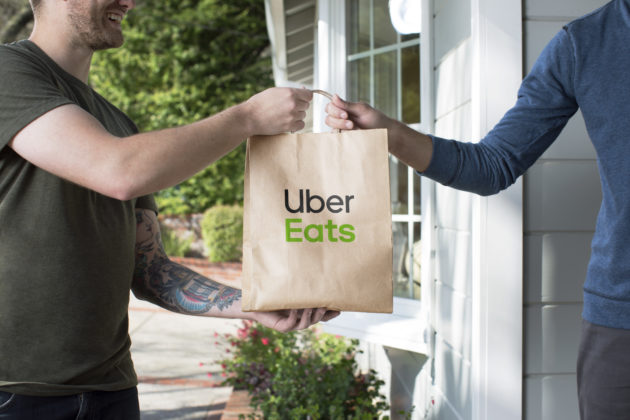
Seattle-area gig workers are making higher hourly wages while they’re delivering food for platforms such as Uber Eats and DoorDash following the implementation of a new minimum wage law. But they’re also getting fewer tips, and consumer demand has likely fallen.
Those are some takeaways from data provided to GeekWire from Solo, a Seattle-based software startup that helps more than 250,000 independent contractors manage their earnings.
The controversial law went into effect in January and set a minimum per-minute and per-mile amount for app-based workers delivering for tech platforms.
The companies responded by adding substantial new fees for consumers — $5 for each order — and say demand has fallen substantially in the subsequent weeks.
Data from Solo shows that the number of active workers on these platforms fell by around 15% in February, compared to the year-ago period, showing that consumer demand has likely indeed fallen in Seattle.
Hourly earnings are up 8%, Solo said, with base pay — calculated by time and distance — up substantially, by 38%. But tips are down 16%.
“This would suggest that due to the new law, companies are loading most of the required pay into the distance/time calculation for orders,” Solo CEO Bryce Bennett told GeekWire. He said tips typically make up around half of total earnings.
Uber and DoorDash adjusted tip mechanisms in their apps after the law went into effect — for example, lowering the suggested tip amount or moving the tip prompt to after an order is completed.
Bennett noted that January and February are typically slower months for food deliveries.
One caveat to Solo’s data is that it comes from drivers in the Seattle area, not just within city limits where the law applies (though Uber was also adding the fees outside of Seattle).
Uber published a blog post last month with new data showing a 30% decrease in order volume over a six week period in Seattle. DoorDash said it saw 30,000 fewer orders in a two-week period since the law and its new fees were implemented.
Some drivers have voiced concern during City Council meetings over the past few weeks about their decreased income.
Seattle City Council President Sara Nelson told GeekWire last month that she wants to find a solution to help all stakeholders — including restaurants that rely on food delivery orders — and hopes to have a solution that is ready to be discussed among lawmakers toward the end of this month.
In its blog post, Uber argued that Seattle lawmakers miscalculated the cost of driving a vehicle while making a delivery and said the ordinance was developed “with inadequate research and insufficient worker outreach.”
DoorDash said the new law requires the company to pay drivers in Seattle at least $26.40, before tips and pay for mileage — well above the city’s $19.97 minimum wage.
DoorDash told GeekWire last week that it is seeing some drivers in Seattle purposely delaying deliveries given that they are paid more while working.
“As we repeatedly warned, this poorly-written law is encouraging fraud, reducing quality for consumers, harming merchant reputations, and penalizing the vast majority of Dashers who continue to do the right thing,” a DoorDash spokesperson said in a statement.
Seattle is one of the first cities to implement this type of minimum wage. New York City passed a similar ordinance last year.
The ordinance is part of several unique “PayUp” protection laws approved recently in Seattle designed to provide protections to gig workers that are treated as independent contractors. Some studies show that gig workers are sometimes paid less than minimum wage or subject to poor working conditions.
The new laws in Seattle coincide with the broader debate over how gig workers should be compensated, and whether they should be treated as employees or independent contractors.
Bennett, a former operations manager at Uber who co-founded Solo in 2021, said Seattle and the state of Washington are “moving the conversation in the right direction” as it relates to providing a safety net for gig workers.
But he said it’s a difficult needle to thread for policymakers given that drivers highly value the flexibility that is offered by this type of work.
“They get the benefits of controlling their own time and the opportunity to potentially earn more,” he said. “However, we’ve seen that people want more protection.”
In Seattle, the minimum pay law — and the response from the companies — may be “tipping the marketplace over a little bit,” Bennett said.
“There will be better pay if you can get on these platforms — but the ability to get on the platforms and earn may become fewer and farther between,” he said. “That’s where you may be getting into the negative set of trade-offs, for what the intended outcome was.”

